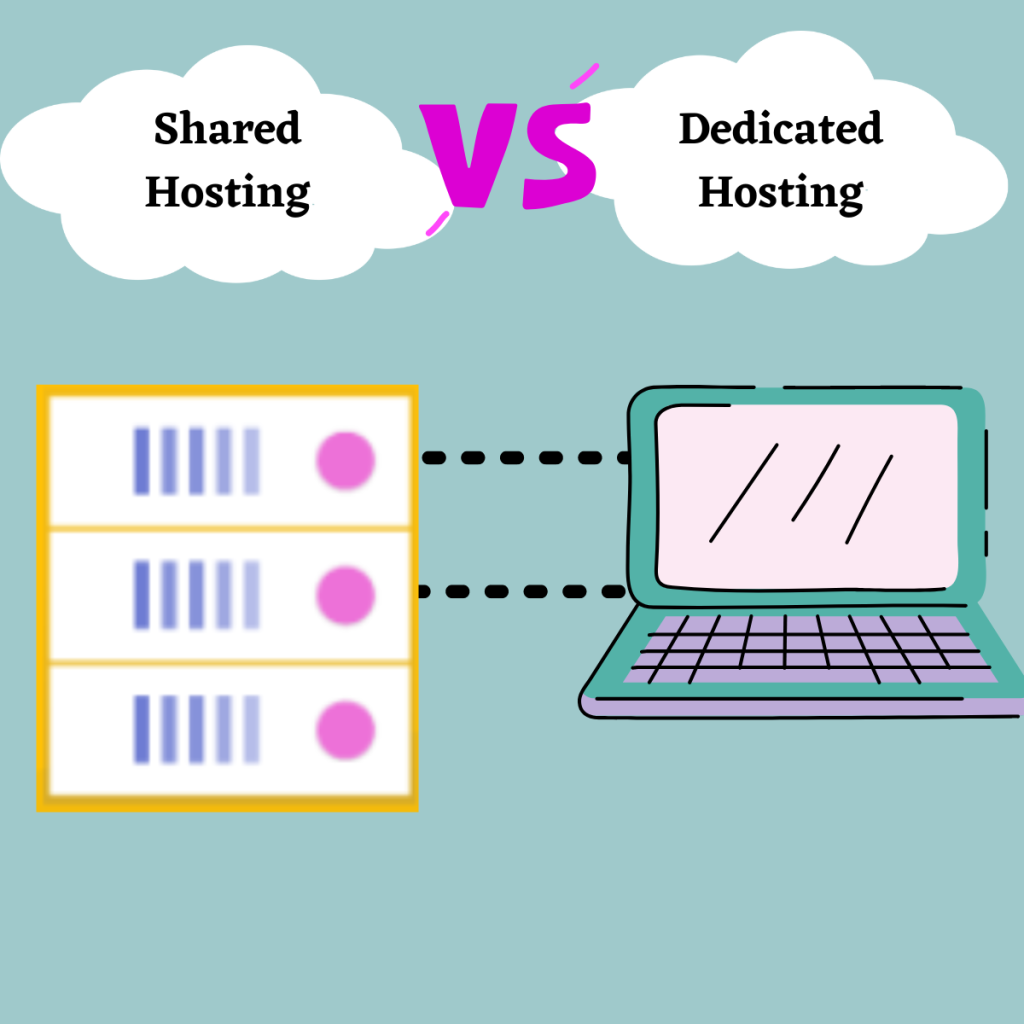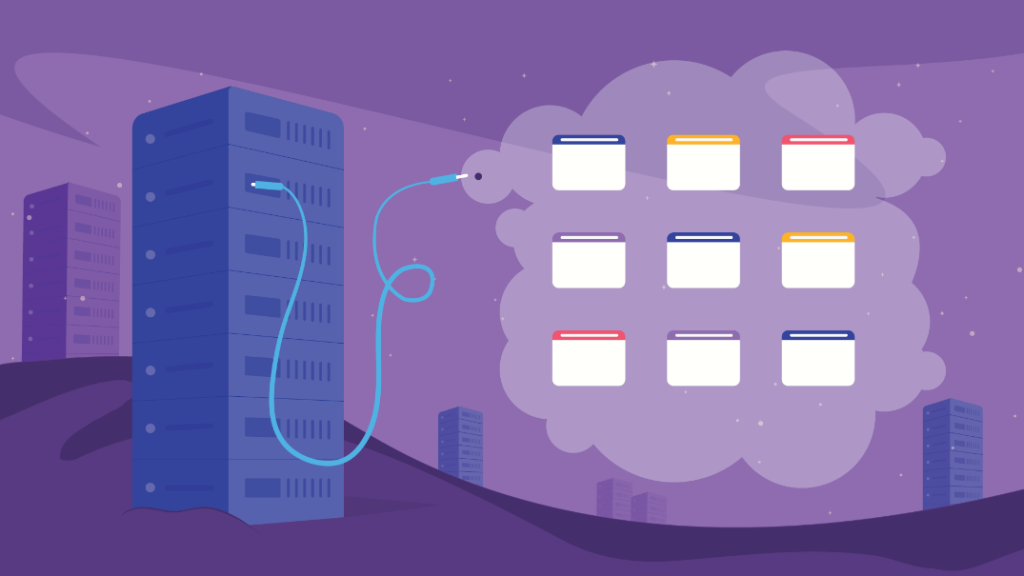Do you have your website but with no hosting provider? Then you must know it is as useless as you own a bike with no wheels, and you can’t go anywhere.
A website that isn’t accessible via the World Wide Web shares the same characteristics.

Let’s find out how shared or dedicated hosting would make your website useful.
What is Shared Hosting?
Shared hosting enables the hosting on a single web server of numerous websites, users, and accounts. With shared hosting, several websites can share a single server. Typically, you won’t know whose or what websites you’re sharing with a server’s resources. The absolute amount of web servers that each client may utilize is often capped, however, this is determined by your hosting plan.

Web hosting companies, who frequently have several Web servers on-site, typically provide shared hosting. A logical division or region on the Web server is created upon registration with the provider and holds data specifically for that website.
Shared hosting is advised for when websites that are smaller in size, receive less Web traffic, have significantly lower security concerns, and need hosting services at a reasonable price, shared hosting is advised.
What is Dedicated Hosting?
A leased hosting (or servers) leased to a specific business customer is known as dedicated hosting. Since the client has total control over the device, they can customize it to meet their specific needs, including those related to performance and security. The hosting company provides the actual server hardware, the surrounding infrastructure, the related services, and technical support.
In addition to providing the server hardware, this host may also offer administrative and other services. Because the organization has complete control over the server, its software, and security systems, this arrangement is thought to be more flexible for the client than shared server arrangements. A dedicated server may occasionally be less expensive.
Other names for dedicated hosting include managed hosting and dedicated servers.
Let’s read about the difference between shared hosting and dedicated hosting.
Shared Hosting Vs Dedicated Hosting
Your website’s data is stored on a single server for both shared and dedicated hosting. This server transmits your data to web surfers when they access your website through their browsers.
What sets apart the two hosting choices is the type of server that hosts your website. In shared hosting, your website shares space with those of nearby users who are also utilizing the same server. Your website has its server when using a dedicated hosting package. Both shared and dedicated hosting has specific benefits and drawbacks.
Pros and Cons of Shared Hosting
Here is an overview of shared hosting’s pros and cons. Let’s proceed with the pros first.
Advantages of Shared Hosting
Shared hosting is a fantastic choice in many circumstances for several reasons, including:
1) Easy to use
As soon as you pay for the service, the hosting provider can have your web environment configured automatically. This implies that you can begin creating your website right away.
2) Affordable costs
Almost always, shared hosting will be the least expensive choice. However, despite its low cost, the services offered are frequently still incredibly good.
3) The technology used effectively:
Running a lot of websites over one server is a great way to make the server’s resources. The server can easily manage all the requests because each website user visits websites at different times.

Disadvantages of Shared Hosting
Shared hosting has some limitations, particularly in comparison to a dedicated server. To make sure you’re aware of the following disadvantages of shared hosting:
1) Quality issues
When using shared hosting, you need to make sure you select a reputable provider. Numerous cheap hosting companies make compromises, which leads to a low-quality hosting experience.
2) Functions impacted by other websites
All the websites on the server share the same resources, but if something happens to one website, it can affect the function of other websites too. Your site may appear more slowly or even crash when a site on a server like yours suffers a significant spike in traffic, for instance.
3) Increased security threats
The possibility of your server’s IP address being banned if another user from the same host is transmitting spam is another risk of shared hosting. Make sure the web hosting company you chose has restrictions against this abuse if you don’t want your emails to end up in your receivers’ spam folders.
Pros and Cons of Dedicated Hosting
Take a look at the list of advantages and disadvantages of dedicated web hosting we have provided below:
Advantages of Dedicated Hosting
There are many advantages to choosing dedicated hosting for your website. Some of them are as follows:
-
Higher performance consistency
The performance of your website will be directly affected by the productivity of other websites that use the same server when you share one. There are no problems with dedicated web hosting in this area. You won’t have to be concerned about the server’s reliability declining as a result of sharing its resources with others.
-
Control over the server is yours.
As was already mentioned, when you select a dedicated hosting plan, you have sole control over the server. You can then install any extra software, applications, or programs that you’d want to fully configure the server to match all of your unique demands and requirements.
-
More secure and reliable
You never have to worry about other sites bringing viruses or security risks into the server because it is solely utilized by your website. Additionally, you will be able to add any extra security precautions and modify the security to suit your particular requirements. Simply dedicated web hosting is far safer and more secure than shared hosting.
Disadvantages of Dedicated Hosting
-
Cost
The cost is a very significant disadvantage. Why is that? In comparison to shared servers, the issue of membership costs is extremely different. Why is it so costly? You don’t have to share content with any other sites since the entire server and all of its resources are reserved for your site.
But a high price always comes with really good quality, right?
-
Technical expertise, and maintenance
Another drawback of dedicated hosting is a high level of technical expertise is required, and your dedicated server needs updates and patches installed, which could interfere with your other obligations.
Dedicated hosting costs more than shared hosting since it includes more sophisticated features. It is among the priciest hosting options available. All additional capabilities are fee-based, but for individuals who require total control and flexibility over their hosting, they are unquestionably worthwhile.
Shared hosting plans are typically more vulnerable to cyberattacks than dedicated hosting in terms of security and dedicated hosting. This is because there is more potential for security breaches. After all, several users share the server. Conclusively, dedicated hosting is safer than shared hosting.
Comments are closed.

One comment
Pingbacks and Tracebacks
[…] Dedicated hosting tends to be more expensive than shared or VPS hosting. Before committing, carefully consider your budget to ensure that the hosting plan […]